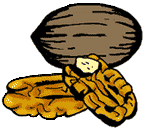 Camp Verde Pecan Show - January 10, 2007 Jeff Schalau, County Director, Associate Agent, Agriculture & Natural Resources Arizona Cooperative Extension, Yavapai County On February 10 (9 am to 5 pm) and 11 (10 am to 4 pm), 2007, the Town of Camp Verde will host its Seventh Annual Pecan, Wine, and Antique Festival. The Festival features a pecan show, locally grown pecans, pecan pie, Arizona wines (including tasting), and antique vendors and displays, live music, and food vendors. The festival is an excellent opportunity to enjoy locally/regionally produced agricultural products, browse for antiques, and relax. I encourage all backyard pecan growers to enter the pecan show. Yavapai County Master Gardeners will prepare the pecan samples and Dr. Michael Kilby, retired University of Arizona Fruit, Nut and Vine Specialist will judge the show. If you are entering a pecan sample, make sure you include at least 40 unshelled nuts from a single tree. Last year, I published some guidelines to help prepare entries (see the January 25, 2006 Backyard Gardener column on the web site listed below or call the Cottonwood Cooperative Extension Office for a reprint of the column). Bring entries to the Town of Camp Verde Parks and Recreation office (corner of Main St. and Holloman) by 5:00 PM on February 8, 2007. Their phone number is 928-567-0535. Pecans are relatives of the hickory and native to the southern United States. Pecan trees make an excellent shade tree and will produce a good nut crop in several areas of the Verde Valley. In fact, Camp Verde has close to 200 acres in pecans that produce approximately 200,000 lbs of pecans annually. Deep alluvial soils found on river and stream terraces are the best sites for pecans in the Verde Valley. Whatever the soil conditions, good drainage is the most critical factor when selecting suitable sites. Caliche layers should be well broken up before planting. In addition, sites above 3,500 feet in elevation are not suitable for pecans. Pecan seedlings can produce decent nuts, but there are no guarantees. If your objectives include a high-quality nut crop, then use grafted varieties. More than one (preferably three) proven varieties will increase the nut yield by providing cross-pollination. Some appropriate varieties include: Apache, Burkett, Choctaw, Cheyenne, Mohawk, Sioux, Wichita, and Western Schley. These varieties are grafted to a proven rootstock. Pecans should be planted between January and mid-March. Bare root trees are most desirable. Never let the roots dry out . This is the major cause of tree death after planting. When planting, dig a hole at least three feet deep and two feet wide. Fill the hole half full with water, place the tree at the same depth as it was grown at the nursery, then add soil. The soil should force all air pockets out. Pecan trees need regular watering and should not be considered where water supplies are limited. As with any fruit or nut bearing tree, proper pruning is critical. The first five years are most important in developing the modified central leader and scaffold branch framework of the tree. Earlier nut production will occur on trees with the fewest pruning cuts. Pecan trees also require close attention to mineral nutrition. Nitrogen fertilization regulates shoot growth. Too little nitrogen results in diminished shoot growth leading to low vigor and reduced photosynthesis. Too much nitrogen results in excessive shoot growth, which removes energy from nut production. The correct amount of nitrogen will result in 10 to 16 inches of shoot growth per year and optimum nut yields once the tree reaches bearing age. Zinc nutrition is also critical to pecan growth and nut production. Pecan trees deficient in zinc will have a condition called "rosette". Here, new leaves are greatly reduced in size, have thickened veins, and are brittle to the touch. To avoid this condition, a zinc sulfate application should be sprayed directly to the foliage when spring growth begins. In some cases, more than one zinc application is necessary depending on the site and pecan variety. The University of Arizona Cooperative Extension has publications and information on gardening and pest control. If you have other gardening questions, call the Master Gardener line in the Cottonwood office at 646-9113 ext. 14 or E-mail us at cottonwoodmg@yahoo.com and be sure to include your address and phone number. Find past Backyard Gardener columns or submit column ideas at the Backyard Gardener web site: http://cals.arizona.edu/yavapai/anr/hort/byg/. |